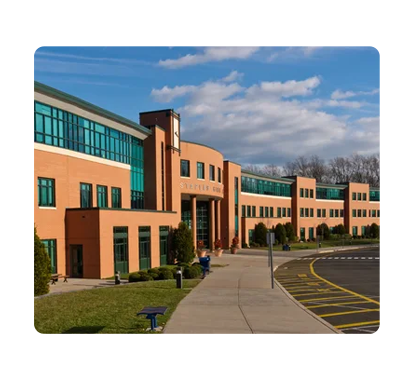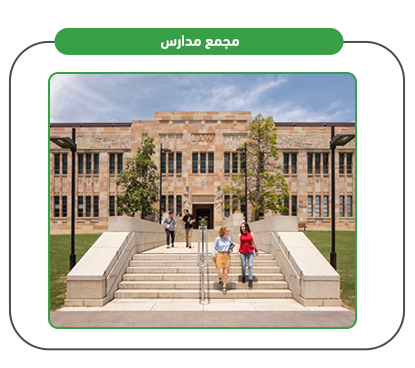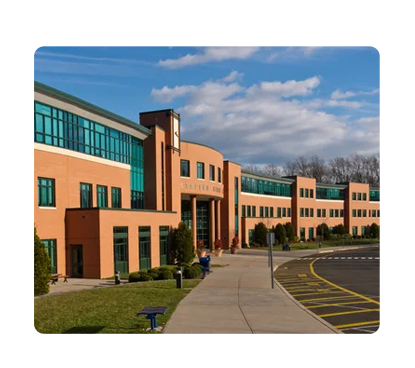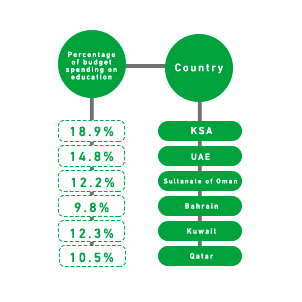A school complex project is a visionary educational initiative aimed at providing a comprehensive environment that integrates academic excellence with the personal development of students. The complex includes a variety of modern schools designed to the highest standards and equipped with the latest technologies and advanced infrastructure, addressing the needs of future generations. The project features smart classrooms, state-of-the-art scientific laboratories, resource-rich libraries, and green spaces with gardens designed to enhance the educational experience and foster creativity. The complex emphasizes extracurricular activities, including sports, arts, and innovation, by providing versatile sports facilities and a theater dedicated to artistic performances. The project aims to develop students’ skills in both academic and social aspects while enhancing their abilities in critical and creative thinking. The school complex stands out with an advanced security system ensuring the safety of students around the clock, which enhances the confidence and peace of mind of parents. Furthermore, the project places significant importance on collaboration between families and the school, organizing regular workshops and guidance programs for parents to achieve integration between education and upbringing in a safe, inclusive environment that meets everyone’s expectations.

The School Complex Project represents an innovative model in the development of the educational system, aiming to provide an integrated learning environment that meets future needs. The complex focuses on offering a comprehensive educational experience by incorporating the latest technologies into the learning process, thereby enhancing positive interaction between teachers and students. The project includes innovative learning spaces designed to stimulate creativity and promote interactive learning, in addition to educational halls equipped with advanced digital technologies that support improved comprehension and understanding among students.
The school complex project includes state-of-the-art sports facilities and dedicated spaces for artistic and creative activities, achieving a balanced approach between academic education and physical and artistic development. The project also focuses on fostering teamwork and collaboration among students, helping to enhance their social and leadership skills.
Moreover, the school complex provides comprehensive support services, including educational and psychological counseling, to create a supportive environment for students. All these components come together to deliver a pioneering educational experience focused on building students’ character and developing their skills to confidently and successfully face future challenges.

Smart classrooms equipped with modern technologies.
Advanced science laboratories.
Libraries rich in educational resources.
Green spaces and educational gardens.
Multi-purpose sports facilities.
A theater and halls for artistic and creative performances.
Extracurricular activities that enhance students’ mental and psychological health.
A sophisticated security system to ensure student safety.
Workshops and orientation programs for parents.
Educational and psychological counseling to support students.


An integrated and innovative educational environment.
Use of the latest educational technologies.
Advanced sports and artistic facilities.
Enhancing creative and critical thinking among students.
Supporting extracurricular activities to develop personal skills.
A comprehensive security system to protect students.
Strengthening collaboration between family and school.
Educational and psychological support services.
Modern designs that adhere to sustainability standards.
A stimulating environment to develop social and leadership skills.
Executive summary
Study project services/products
Market Size Analysis
Risk Assessment
Technical study
Financial study
Organizational and administrative study

The Education Sector in GCC Countries
Because “Mashroo3k” Economic Consulting and Market Research Company believes in the importance of the education sector and its role in localizing national labor, it presents below the key indicators of the educational sector in GCC countries, thereby encouraging investment in this vital sector:
The total number of students in the Early Childhood Development stage (including nurseries and kindergartens) in GCC countries, according to the latest available statistics, reached 851.5 thousand students.
The number of school education students in the GCC was estimated at 9.3 million students (79.4% in the public sector and 20.6% in the private sector).
The number of adult education center learners was estimated at 181,247 students.
The number of higher education students was 2,206,446 students.
The number of early childhood education teachers was 50,647 teachers.
The number of school education teachers was estimated at 727,904 teachers.
There are 5,806 educational institutions operating at the early childhood stage.
There are 32,310 educational institutions operating at the school education stage.
Over the past years, governments in GCC countries have sought to bridge the gap between education and the labor market. They have adopted curricula that increase the share of vocational and technical education and encourage learning through modern media and technologies. It is also worth noting the increase in government spending by these six countries on education and its quality to graduate generations that meet the private sector’s labor needs.
According to the latest statistics:
Saudi Arabia spends 18.9% of its budget on education.
The UAE spends 14.8%.
Oman spends 12.2%.
Bahrain spends 9.8%.
Kuwait spends 12.3%.
Qatar spends 10.5% of its budget on education.
By the year 2023, the value of the private education market in GCC countries is expected to reach $26.2 billion.
The Global Education Sector:
The size of the global educational services market reached approximately $2,882.52 billion by the end of 2021, and global experts expect it to reach $3,191.79 billion by the end of 2022 — achieving a compound annual growth rate (CAGR) of 10.7%.
By 2026, the market value is projected to increase to $4,623.90 billion, achieving a CAGR of 9.7% over the forecast period.

By 2030, the global value of education as an industry is expected to reach $10 trillion USD.
By 2024, the global online education market is projected to reach $247.46 billion USD.
The AI-powered education market is expected to expand at a compound annual growth rate (CAGR) of 36% from 2022 to 2030.
In the year 2000, the number of pupils worldwide was approximately 657 million, and this number increased to 739 million by 2019.
In 2000, the number of secondary education students was around 452 million, rising to 601 million by 2019.